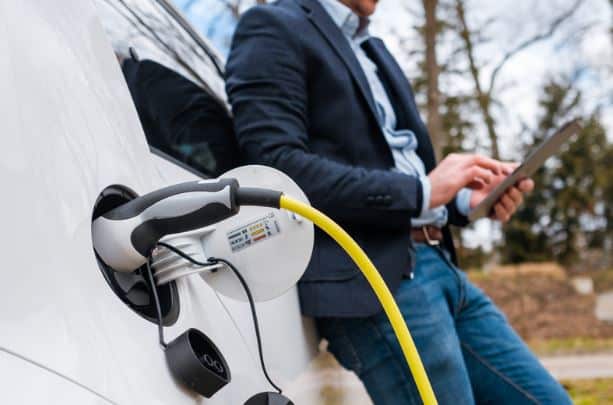The rise of electric vehicles (EVs) has spurred a growing demand for EV charging stations. As more drivers shift to electric vehicles, understanding the ins and outs of installing EV charging stations becomes crucial. This comprehensive guide covers everything you need to know about home or workplace charging stations in 2024, from costs and installation considerations to rebates and electrical rates across Canadian provinces.
For private businesses wanting to capture potential parking stalls charging network, This article will also explore how the public ev charging network. The federal government is interested to invest in coast to coast network of charging platform through incentivized programs.
Understanding EV Charging Stations

What is an EV Charging Station?
An EV charging station provide charging to electric vehicles. The time to fully recharge a vehicle depends on the power supply, and the types of the electrical system. There are various types of EV charging stations, ranging from residential garage chargers to fast charging stations available in public charging locations.
Types of EV Charging Stations
- Level 1 Chargers: These use a standard 120-volt outlet and are best suited for overnight home charging. They are well suited for drivers who do not require frequent full recharges.
- Level 2 Chargers: These require a 240-volt outlet and are commonly installed in residential garages and commercial locations. They provide a faster charge compared to Level 1 and are ideal for those needing more rapid home charging.
- Level 3 Chargers (DC Fast Charging stations): These specialized stations provide rapid charging, often found in public charging locations along highways and major routes. They are part of a broader charging network that offers quick access for long-distance travelers.
Understanding DC vs. AC Charging Station for Electric Car

Electricity can be delivered in two main forms: Direct Current (DC) and Alternating Current (AC). Understanding these forms is crucial, especially when it comes to installing charging stations for electric vehicles (EVs).
Direct Current (DC)
Definition and Properties:
- Uni-directional Flow: DC is characterized by a constant flow of electric charge in one direction.
- Consistent Voltage: DC maintains a steady voltage level, making it ideal for applications requiring stable power, such as electronic devices and battery charging.
Generation and Conversion:
- Sources: Batteries, solar panels, and fuel cells generate DC power directly.
- Conversion: AC can be converted to DC using rectifiers, which are essential for charging batteries since they store energy in DC form.
Applications:
- Battery Charging: All rechargeable devices, including EVs, use DC to charge their batteries.
- Electronics: Small gadgets, laptops, and mobile phones typically use DC power.
Alternating Current (AC)
Definition and Properties:
- Periodic Reversal: AC current periodically reverses direction, typically in a sine wave pattern.
- Variable Voltage: AC voltage can be easily transformed to higher or lower levels using transformers, making it suitable for long-distance transmission.
Generation and Conversion:
- Sources: Power plants generate AC power, which is distributed via the electrical grid.
- Conversion: AC can be converted to DC using rectifiers for applications requiring DC power.
Applications:
- Household Power: Most residential and commercial buildings use AC power for appliances and lighting.
- Long-Distance Transmission: AC is preferred for transmitting electricity over long distances due to its ability to be easily stepped up or down in voltage.
Charging Stations: AC vs. DC
AC Charging Stations:
- Slow Charging: AC chargers are generally slower, suitable for overnight charging at home or at workplaces.
- Onboard Conversion: The conversion from AC to DC happens inside the vehicle using an onboard charger. This limits the charging speed to the capacity of the onboard charger.
DC Charging Stations:
- Fast Charging: DC chargers provide rapid charging by converting AC to DC externally and delivering DC directly to the vehicle’s battery. This bypasses the onboard charger, allowing for much higher power delivery.
- Power Levels: DC fast chargers can range from 22kW to 300kW, significantly reducing charging time. For example, a 300kW charger can add up to 400km of range in just 15 minutes for compatible vehicles.
Impact on Charging Speed and Power Delivery
- AC Charging: Limited by the vehicle’s onboard charger, typically providing power levels up to 22kW. This results in longer charging times, suitable for overnight or extended parking periods.
- DC Charging: Capable of delivering much higher power levels directly to the battery, reducing charging times significantly. Ideal for quick top-ups during long trips or in public charging stations where rapid turnaround is essential.
Costs of Charging Electric Vehicle

Home or Charging stations
Charging your EV at home is convenient and typically more cost-effective than using public charging stations. The cost depends on your local electricity rates and the capacity of your EV’s battery. Home charging stations can significantly reduce the overall operating costs of an electric vehicle.
Charging Outside (Public Charging Stations at transit corridors)
Public charging stations often have higher rates due to the convenience and faster charging speeds. Prices can vary significantly based on the charging network and location of the charging station.
Electrical Rates Across Canadian Provinces
Here’s a detailed look at the electrical rates and Tesla charging station rates across Canadian provinces. Please note that the rates disclosed below are for reference only as numbers do change frequently. For accurate result, please visit the respective province’s official site for the latest rate:
British Columbia Charging Rate
- Residential Rate: $0.14 per kWh – Homeowners in British Columbia can expect to pay approximately $0.14 per kWh for charging their EVs at home.
- Tesla Supercharger Rate: $0.27 per kWh – Tesla Superchargers in British Columbia charge around $0.27 per kWh, offering faster charging for Tesla owners. Alberta Charging Rate
- Residential Rate: $0.15 per kWh – In Alberta, the residential electricity rate is about $0.15 per kWh for EV charging at home.
- Tesla Supercharger Rate: $0.25 per kWh – Tesla Superchargers in Alberta cost $0.25 per kWh for a quick and efficient charge.
Saskatchewan Charging Rate
- Residential Rate: $0.14 per kWh – Saskatchewan residents pay $0.14 per kWh to charge their EVs at home.
- Tesla Supercharger Rate: $0.22 per kWh – Tesla Superchargers in Saskatchewan are priced at $0.22 per kWh.
Manitoba Charging Rate
- Residential Rate: $0.09 per kWh – Manitoba boasts one of the lowest residential rates at $0.09 per kWh for home EV charging.
- Tesla Supercharger Rate: $0.18 per kWh – Tesla Superchargers in Manitoba charge $0.18 per kWh.
Ontario Charging Rate
- Residential Rate: $0.13 per kWh – In Ontario, the cost for home EV charging is $0.13 per kWh.
- Tesla Supercharger Rate: $0.50 per kWh – Tesla Superchargers in Ontario are available at $0.21 per kWh.
Quebec Charging Rate
- Residential Rate: $0.07 per kWh – Quebec offers the lowest residential rate at $0.07 per kWh for home EV charging.
- Tesla Supercharger Rate: $0.16 per kWh – Tesla Superchargers in Quebec cost $0.16 per kWh.
New Brunswick
- Residential Rate: $0.11 per kWh – In New Brunswick, homeowners pay $0.11 per kWh for charging their EVs.
- Tesla Supercharger Rate: $0.19 per kWh – Tesla Superchargers in New Brunswick are priced at $0.19 per kWh.
Nova Scotia Charging Rate
- Residential Rate: $0.16 per kWh – Nova Scotia’s residential rate for EV charging is $0.16 per kWh.
- Tesla Supercharger Rate: $0.23 per kWh – Tesla Superchargers in Nova Scotia charge $0.23 per kWh.
Prince Edward Island Charging Rate
- Residential Rate: $0.17 per kWh – EV owners in Prince Edward Island pay $0.17 per kWh for home charging.
- Tesla Supercharger Rate: $0.24 per kWh – Tesla Superchargers on Prince Edward Island are available at $0.24 per kWh.
Newfoundland and Labrador Charging Rate
- Residential Rate: $0.12 per kWh – Home charging in Newfoundland and Labrador costs $0.12 per kWh.
- Tesla Supercharger Rate: $0.20 per kWh – Tesla Superchargers in Newfoundland and Labrador charge $0.20 per kWh.
Installation Costs and Considerations

Residential Charging Stations
Installing a residential garage charger typically costs between $500 and $2,500, depending on the charger type and installation complexity. Level 2 chargers are the most popular for home charging due to their balance of cost and charging speed. The cost varies based on the utility connection available and the distance that wires need to travel from the panel of interest to the location of the charger.
Commercial Charging Stations
Commercial stations are more expensive, ranging from $10,000 to $50,000 per station. These costs include the charger, installation, and necessary infrastructure upgrades.
Factors Affecting Installation Costs
- Electrical Upgrades: Some homes or commercial properties may require electrical upgrades to handle the additional load.
- Location: Installation costs can vary based on the proximity to the electrical panel and the complexity of running wiring.
- Permits and Inspections: Local regulations may require permits and inspections, adding to the overall cost.
- Rebates and Incentives: Government rebates and incentives can significantly reduce the cost of installation.
Rebates and Incentives

Federal Rebates
The Canadian federal government offers incentives for installing charging stations. Homeowners can receive up to $5,000 in rebates, while businesses can get up to $50,000.
Provincial Rebates
Many provinces also offer additional rebates. For example:
- British Columbia: Up to $3,000 for residential/condo installations and up to $25,000 for commercial installations. Rebate of up to $350 for single family home. BC Hydro offers additional rebated of up to $250 for selected chargers. For specific details, visit ClearnGoElectric BC
- Quebec: Up to $600 for home charging stations and up to $5,000 for multi-unit residential buildings.
Popular Charger Models
Residential Garage Chargers
- ChargePoint Home Flex: Known for its reliability and fast charging capabilities, ideal for home charging setups.
- JuiceBox 40: Offers smart charging features and high power, making it a popular choice for residential garages.
- Tesla Wall Connector: Ideal for Tesla owners, providing fast and efficient charging at home.
- Grizzle E Avalanche: Aluminum casing for maximum heat dissipation, compatible for all electrical vehicles. This is the model that Elpro Electric recommends.
Commercial Chargers
- ABB Terra 54: A robust fast charger suitable for commercial use, part of a well-suited charging network for businesses.
- ChargePoint Express 250: A versatile and powerful option for businesses, providing rapid charging access.
- EVBox Troniq 50: Known for its durability and efficiency, well-suited for commercial installations.
- Grizzle E Commercial: 40A maximum output with wireless capability. This is a made in Canada unit suitable for any commercial electric vehicle charging stations.
- Tesla DC Fast Charging Stations: Installing a Tesla level 3 charging stations require the approval from Tesla. The average cost of a station ranges anywhere from 50,000 to 100,000.
Operating Costs and Maintenance

Operating costs for EV charging stations are relatively low. For residential chargers, the primary cost is electricity. Commercial stations might incur additional costs for network access and maintenance.
How to Calculate Operating Cost when you own an EV
Let’s say we’re calculating for a Tesla Model 3 (efficiency of 18 kWh/100km) driving 600 km in British Columbia:
- Energy required: (600 / 100) × 18 =108 kWh
- Assuming the BC electricity rate of $0.14 per kWh (this is an example; actual rates vary)
- Charging cost: 108 × $0.14 = $15.12 or 181.44/year
This also means that when charging exclusively using Tesla Supercharger, your cost of juicing up the car will now be 29.16 CAD, or 349.92 CAD per year if this is the average usage.
Maintenance Tips
- Regular Inspections: Ensure all components are in good working condition to prevent electrical hazards.
- Software Updates: Keep charging station software up to date to maintain efficiency and safety.
- Safety Checks: Regularly check for electrical hazards and follow electrical safety tips to ensure safe operation.
Utilizing Mobile Apps and Online Maps
Mobile apps and online maps can help you locate public charging locations, monitor your charging sessions, and access charging networks. Popular apps include PlugShare, ChargePoint, and Tesla’s mobile app.
Installing an EV charging station in 2024 is a worthwhile investment for both homeowners and businesses. By understanding the costs, installation considerations, and available rebates, you can make informed decisions that benefit both your wallet and the environment. Embrace the EV adoption movement and contribute to reducing climate change by providing charging solutions for electric vehicles.




